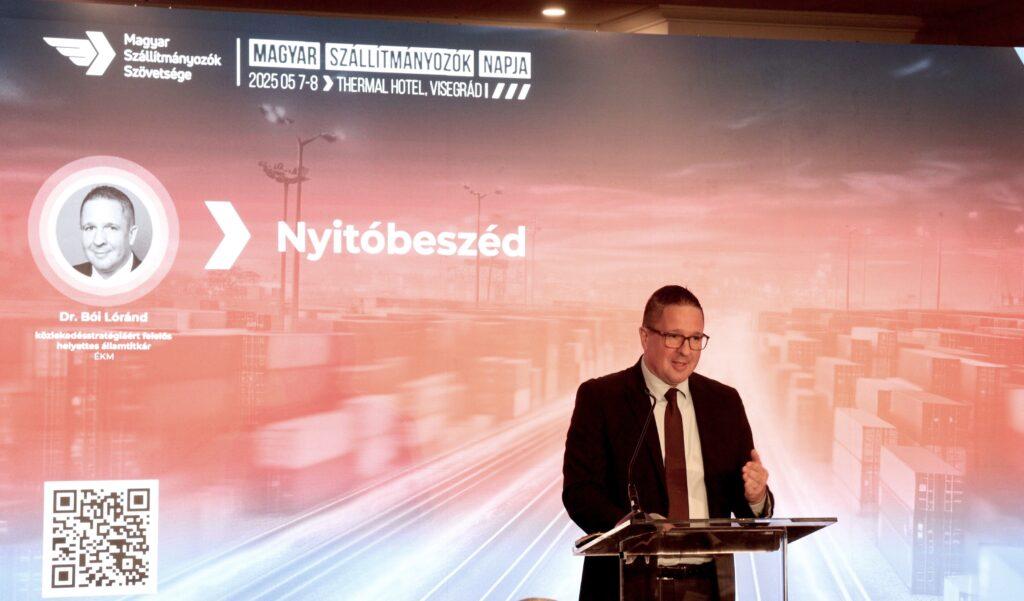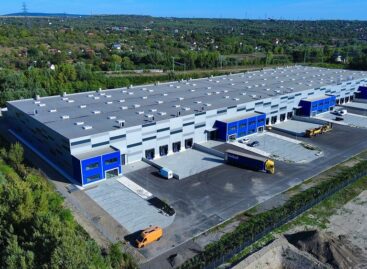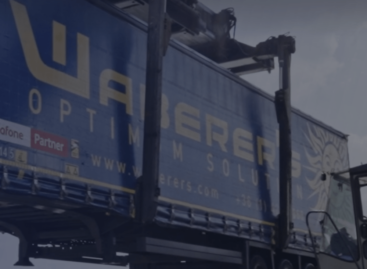More than transportation – The limits and possibilities of logistics on Hungarian Transporters’ Day
“To understand the present and think about the future” – with these words, Dr. Márton Lányi, president of the Hungarian Association of Freight Forwarders (MSZSZ), opened the Hungarian Freight Forwarders’ Day held on May 7–8, 2025. The event has grown far beyond an annual industry meeting: it has become an interdisciplinary knowledge platform where logistics is explored not only as an economic, but also as a geopolitical and technological issue.
Dr. Botond Feledy, foreign policy expert, opened with a sharp overview of global logistics in the shadow of war, trade tensions, and institutional instability. His core message was that logistics is no longer a purely economic function – it is on the verge of becoming a national security matter. From EU capital markets to energy policy and the “trilemma” of democracy, sovereignty and globalization, logistics has become an indicator of broader political choices.
Cybersecurity strategist Arthur Keleti addressed the disruptive power of AI. Generative AI is no longer science fiction: it’s optimizing decision-making, running simulations, and outperforming human logistics planners in controlled environments. “The tech company whose AI wakes up first will rule the world,” he warned, urging the sector to think of AI not just as a tool, but as a partner with strategic impact.
Top executives from companies such as Samsung SDI, LEGO, Nokia and Essity emphasized that sustainability is no longer optional – it’s strategy. Shifting to rail and multimodal transport means redesigning production schedules and internal systems. While businesses are ready to move, structural gaps on the service side – capacity, reliability, infrastructure – still limit real-world execution.
A strong case was made for the 45’ container as a superior solution to semi-trailers in Europe’s intermodal logistics. Experts from Mahart, Rail Cargo, and the Port of Antwerp-Bruges highlighted efficiency, safety, and compatibility with trimodal terminals. Containers can be handled faster, inspected more easily, and better secured than trailers – a point increasingly relevant in a risk-sensitive world.
Dr. Milán Janosov, physicist and network science expert, demonstrated how predictive models based on network analysis can support logistics decisions just as effectively as they do sports tournaments or media forecasts. Companies that master this level of data-driven planning can gain significant market advantage.
In air cargo, Budapest has emerged as a regional leader. With over 300,000 tons handled in 2024 – a 50% increase – the city now outpaces Vienna and Warsaw. But volume growth has also revealed the system’s limits. Airport representatives, freight handlers, and clients emphasized that strategic collaboration, digitalization, and transparency are now essential to maintain performance and client trust.
A roundtable on freight security warned of tougher EU regulations ahead. Road hauliers transporting air cargo will need official security programs, trained security officers, and significant investment by 2026. Speakers from Waberer’s, Lenovo and RRI stressed that real safety can only come from coordination, technology, and quality assurance across the chain.
The program offered unique moments beyond panels and keynotes. Olympic champion water polo coach Dr. Dénes Kemény shared insights on team building, pointing out that even winning teams need change to stay sharp. Broadcaster Gábor Wéber lifted the curtain on the Formula 1 logistics machine – a high-stakes, high-precision global operation requiring 1,400 tons of equipment per race.
At the evening gala in Visegrád, Iván Nagy (Hilltop Logisztikai Kft.) received the Young Freight Forwarder of the Year – Kautz István Memorial Award. The Lifetime Achievement Award went posthumously to Gábor Kiss, a beloved and respected figure in the Hungarian logistics community.
“The Hungarian Freight Forwarders’ Day is here to promote knowledge sharing, community, and forward-looking dialogue,” concluded MSZSZ Secretary General János Pekár. “We try to raise the bar every year – and based on this year’s feedback, we just might have succeeded again.”
Related news
Appeninn expands its portfolio with a logistics center in Poland
🎧 Hallgasd a cikket: Lejátszás Szünet Folytatás Leállítás Nyelv: Auto…
Read more >Record investments, new growth paths – Hungary will be present as an attractive investment destination at MIPIM
🎧 Hallgasd a cikket: Lejátszás Szünet Folytatás Leállítás Nyelv: Auto…
Read more >Related news
The Store of the Future opens again at the SIRHA Budapest exhibition! (Part 3)
🎧 Hallgasd a cikket: Lejátszás Szünet Folytatás Leállítás Nyelv: Auto…
Read more >Amikor a megszámlálhatatlan megszámlálhatóvá válik
🎧 Hallgasd a cikket: Lejátszás Szünet Folytatás Leállítás Nyelv: Auto…
Read more >New country director at the helm of JYSK Hungary
🎧 Hallgasd a cikket: Lejátszás Szünet Folytatás Leállítás Nyelv: Auto…
Read more >










